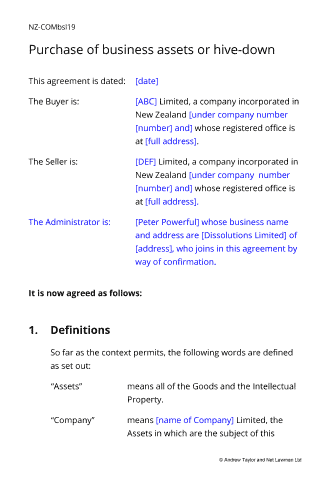Purchase of business assets or hive-down

Document overview


- Length:7 pages (1469 words)
- Available in:
 Microsoft Word DOCX
Microsoft Word DOCX Apple Pages
Apple Pages RTF
RTF

If the document isn’t right for your circumstances for any reason, just tell us and we’ll refund you in full immediately.

We avoid legal terminology unless necessary. Plain English makes our documents easy to understand, easy to edit and more likely to be accepted.

You don’t need legal knowledge to use our documents. We explain what to edit and how in the guidance notes included at the end of the document.

Email us with questions about editing your document. Use our Lawyer Assist service if you’d like our legal team to check your document will do as you intend.

Our documents comply with the latest relevant law. Our lawyers regularly review how new law affects each document in our library.
About this document
The most important feature of this agreement is that the seller gives no warranties. Risk for the assets bought is taken entirely by the purchaser.
It can be used for the sale of any type or combination of types of assets including machinery and equipment, stock, and work in progress. The only type of asset which it cannot transfer is real property (land and buildings), for which the involvement of a solicitor is required by law.
The document could be used in many situations, including the following:
- A hive-down, where assets are disposed to a company, possibly a shell, in order for the shares in that company to be subsequently sold. It may be more tax efficient for the ultimate buyer to purchase the assets within a company structure rather than as assets by themselves, yet he or she may not want the obligations or the history of the original business.
- A hive-up, where assets are bought by a parent business in order for the subsidiary to be sold separately or liquidated.
- A sale by a liquidator or administrator or trustee in bankruptcy.
- The owner of an unincorporated business wishes to sell assets so that he or she can move to another area, close the business or change the strategic direction of the business.
- The owner of insurance re-claimed or fire-damaged goods wishes to sell them as seen.
- A person is declared insolvent and the receiver is selling the assets as per order of the court.
- The counter party – the acquirer – may be any person, business or other organisation.
Features
This agreement is written in plain English, and is drawn for maximum flexibility and ease of use.
Key features are:
- one step completion - buyer makes payment and take possession of goods
- is not specific to any particular industry
- can include sale of intellectual property
- includes only the most basic warranties
- provides options for payment
- allow you to construct commercial terms to suit your exact business needs
- includes practical and commercial help and suggestions
Alternative documents for slightly different situations
If you are only selling heavy physical assets then use this agreement for the purchase of used plant or physical assets. It provides for transportation and delivery.
If the assets are intellectual property, an IP sale agreement may be more suitable.
If you are selling an entire business, whether as a going concern or not, then you should use a business sale and purchase agreement if the business is unincorporated and a company sale agreement for selling shares. These agreements are much fuller and include a menu of warranties for both sides.

Recent reviews
Choose the level of support you need
Document Only
This document
Detailed guidance notes explaining how to edit each paragraph
Lawyer Assist
This document
Detailed guidance notes explaining how to edit each paragraph
Unlimited email support - ask our legal team any question related to completing the document
- Review of your edited document by our legal team including:
- reporting on whether your changes comply with the law
- answering your questions about how to word a new clause or achieve an outcome
- checking that your use of defined terms is correct and consistent
- correcting spelling mistakes
- reformatting the document ready to sign
All rights reserved
